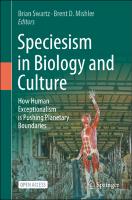Speciesism in Biology and Culture
How Human Exceptionalism is Pushing Planetary Boundaries
Contributor(s)
Swartz, Brian (editor)
Mishler, Brent D. (editor)
Language
EnglishAbstract
This open access book explores a wide-ranging discussion about the sociopolitical, cultural, and scientific ramifications of speciesism and world views that derive from it. In this light, it integrates subjects across the natural sciences, social sciences, and humanities. The 21st-century western world is anthropocentric to an extreme; we adopt unreasonably self-centered and self-serving ideas and lifestyles. Americans consume more energy resources per person than most other nations on Earth and have little concept of how human ecology and population biology interface with global sustainability. We draw upon religion, popular culture, politics, and technology to justify our views and actions, yet remain self-centered because our considerations rarely extend beyond our immediate interests. Stepping upward on the hierarchy from “racism,” “speciesism” likewise refers to the view that unique natural kinds (species) exist and are an important structural element of biodiversity. This ideology manifests in the cultural idea that humans are distinct from and intrinsically superior to other forms of life. It further carries a plurality of implications for how we perceive ourselves in relation to nature, how we view Judeo-Christian religions and their tenets, how we respond to scientific data about social problems such as climate change, and how willing we are to change our actions in the face of evidence.
Keywords
Speciesism; anthropocentric practices; conservation biology; ecological and evolutionary history; environmental ethics; religion and cultureDOI
10.1007/978-3-030-99031-2ISBN
9783030990312, 9783030990312Publisher
Springer NaturePublisher website
https://www.springernature.com/gp/products/booksPublication date and place
Cham, 2022Imprint
Springer International PublishingClassification
Evolution
Climate change
History
Conservation of the environment
Ethics and moral philosophy
Sustainability


 Download
Download Web Shop
Web Shop